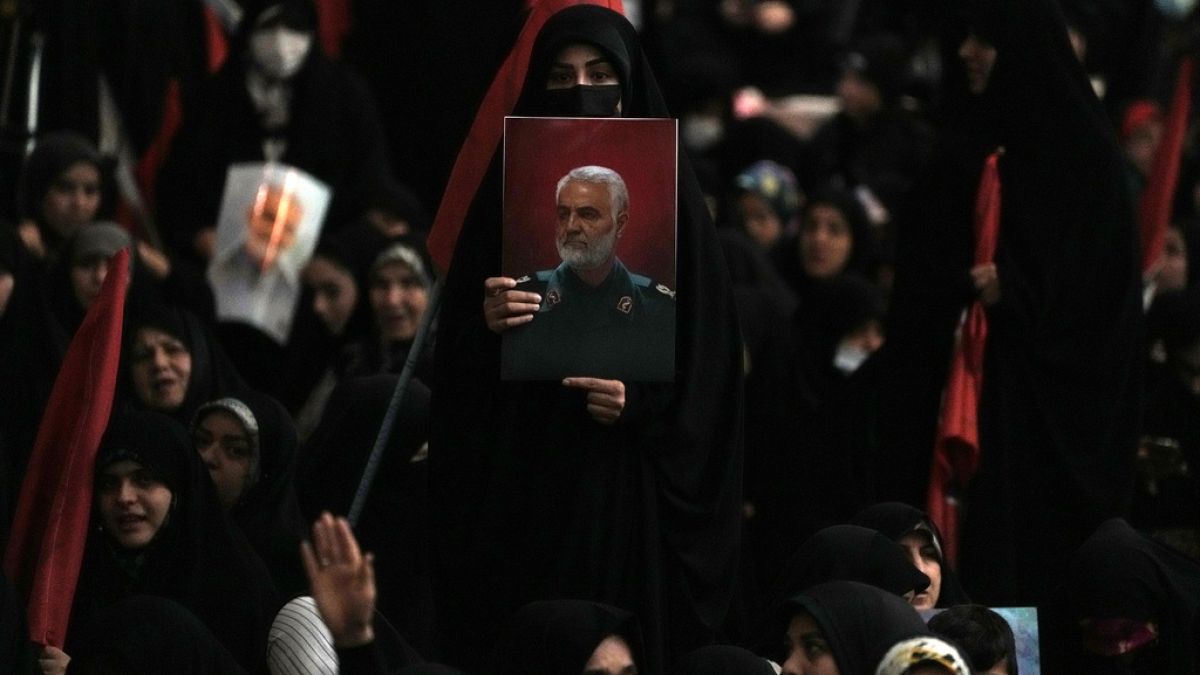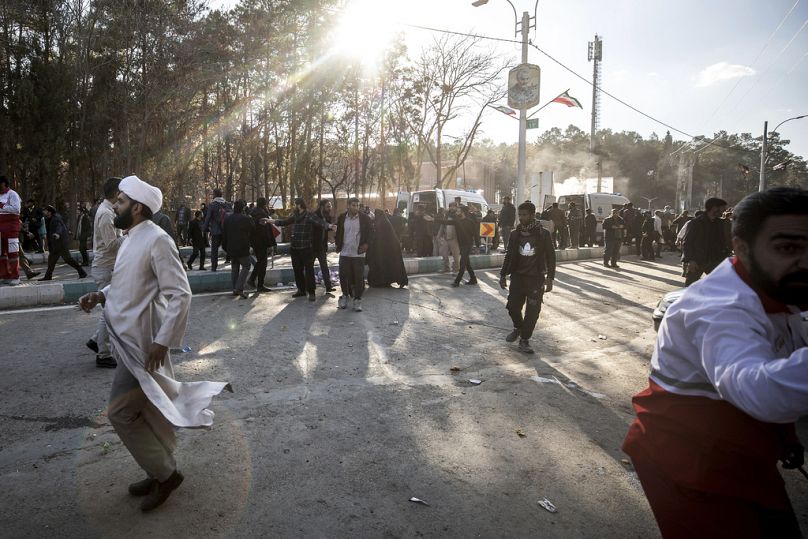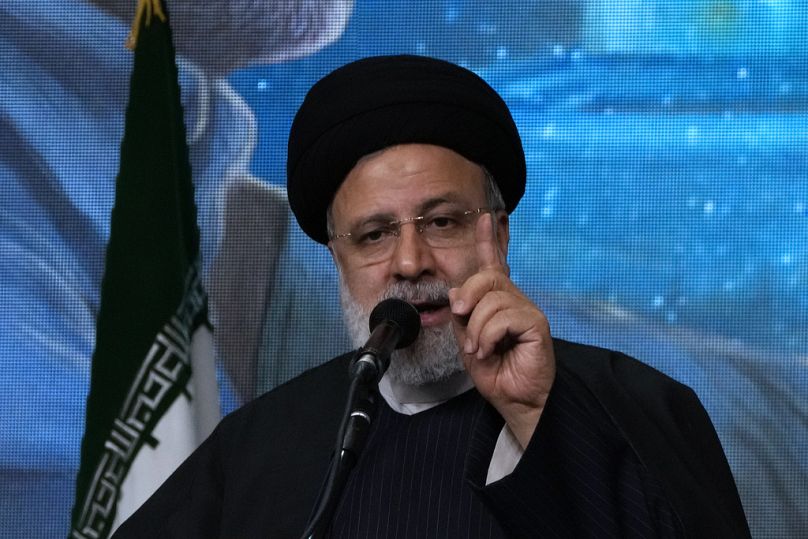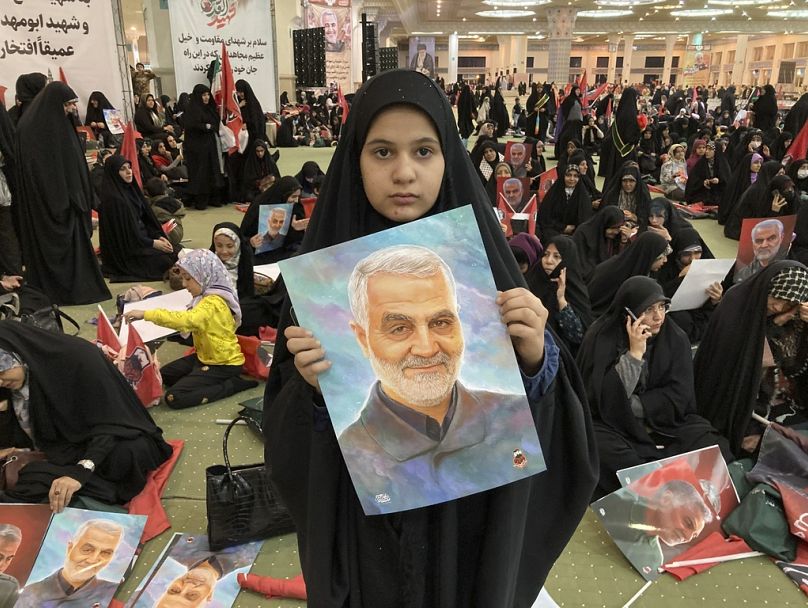Qassim Soleimani, the head of the Revolutionary Guard's elite Quds Force, died in a US drone strike in Iraq in January 2020.
Two bombs killed at least 95 people during a commemoration for a prominent Iranian general slain by the US in a 2020 drone strike, Iranian officials said, as the Middle East remains on edge over Israel's war with Hamas.
No one immediately claimed responsibility for what the deadliest militant attack to target Iran since its 1979 Islamic Revolution.
Iran's leaders vowed to punish those responsible for the blasts, which wounded at least 211 people.
The explosions struck minutes apart on Wednesday, shaking the city of Kerman, about 820 kilometres southeast of the capital, Tehran. The second blast sprayed shrapnel into a screaming crowd fleeing the first explosion.
An earlier death toll of 103 was revised lower after officials realised that some names had been repeated on a list of victims, Iran's health minister, Bahram Einollahi, told state TV.
Many of the wounded were in critical condition, however, so the death toll could rise.
The gathering marked the fourth anniversary of the killing of Gen. Qassem Soleimani, the head of the Revolutionary Guard’s elite Quds Force, in a US drone strike in Iraq. The explosions occurred near his gravesite as long lines of people gathered for the event.
Iranian state television and officials described the attacks as bombings, without immediately giving clear details of what happened. The attacks came a day after a deputy head of the Palestinian militant group Hamas was killed in a suspected Israeli strike in Beirut.
The first bomb Wednesday was detonated around 3 p.m. local time, and the other went off some 20 minutes later, the Iranian interior minister, Ahmad Vahidi, told state television. He said the second blast killed and wounded the most people.
A delayed second explosion is often used by militants to inflict more casualties by targeting emergency personnel responding to an attack.
Iranian authorities said Thursday would be a national day of mourning.
Iran's Supreme Leader Ayatollah Ali Khamenei said the attackers will face “a harsh response,” though he didn't name any possible suspect. Iranian President Ebrahim Raisi added: "Undoubtedly, the perpetrators and leaders of this cowardly act will soon be identified and punished.”
Iran has multiple foes who could be behind the assault, including exile groups, militant organisations and states.
While Israel has carried out attacks in Iran over its nuclear programme, it has conducted targeted assassinations, not mass casualty bombings.
A US State Department spokesman, Matthew Miller, said American officials had “no reason” to believe Israel was involved in Wednesday's attack in Iran.
That was echoed by National Security Council spokesman John Kirby at the White House, who said “Our hearts go out to all the innocent victims and their family members.”
Sunni extremist groups including the Islamic State group have conducted large-scale attacks in the past that killed civilians in Shiite-majority Iran, though not in relatively peaceful Kerman.
Iran itself has been arming militant groups over the decades, including Hamas, the Lebanese Shiite militia Hezbollah and Yemen’s Houthi rebels. As Israel wages its devastating war in Gaza after Hamas' 7 October attack that killed 1,200 people, both Hezbollah and the Houthis have launched attacks targeting Israel that they say come on behalf of the Palestinians.
Soleimani was the architect of Iran’s regional military activities and is hailed as a national icon among supporters of Iran’s theocracy. He also helped secure Syrian President Bashar Assad's government after the 2011 Arab Spring protests against him turned into a civil, and later a regional, war that still rages today.
Relatively unknown in Iran until the 2003 US invasion of Iraq, Soleimani’s popularity and mystique grew after American officials called for his killing over his help arming militants with penetrating roadside bombs that killed and maimed US troops.
A decade and a half later, Soleimani had become Iran’s most recognisable battlefield commander, ignoring calls to enter politics but growing as powerful, if not more, than its civilian leadership.
Soleimani’s death has drawn large processions in the past. At his funeral in 2020, a stampede broke out in Kerman and at least 56 people were killed and more than 200 were injured as thousands thronged the procession.
Until Wednesday, the deadliest attack to strike Iran since the revolution was the 1981 truck bombing of the Islamic Republican Party’s headquarters in Tehran. That attack killed at least 72 people, including the party’s leader, four government ministers, eight deputy ministers and 23 parliament members.
In 1978 just ahead of the revolution, an intentionally set fire at the Cinema Rex in Abadan killed hundreds of people.



